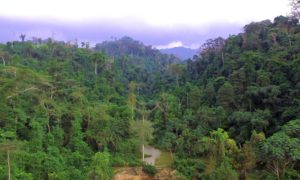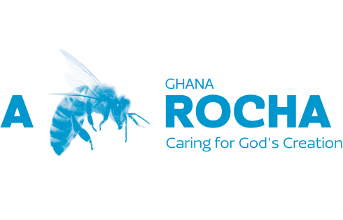Don’t let Chinese banks invest in mining Atewa Forest for bauxite
On November 29, 2018, the Directors of the Green Livelihoods Alliance in Ghana — A Rocha Ghana, Tropenbos Ghana and Friends of the Earth Ghana — published a letter to the Chinese Ambassador to Ghana requesting him to advise Chinese banks not to invest in or support bauxite mining in Ghana’s precious Atewa Forest.
You can read the letter below and also download here: Open letter to the Ambassador of China to Ghana re Atewa Forest
Open letter to the Chinese Ambassador to Ghana from the Directors of the Green Livelihood Alliance partners
To H.E. Shi Ting Wang, Chinese Ambassador to Ghana
Your Excellency, the Directors of the Green Livelihoods Alliance partners – Friends of the Earth-Ghana, A Rocha Ghana, and Tropenbos Ghana – wrote to you recently requesting a meeting to discuss the potential role of China in Ghana’s bauxite development and the impact it may have on the Atewa Forest. As the meeting did not take place, we are now reaching out to you in this open letter.

File Photo: Atewa Forest Reserve
Your Excellency, as you will surely be aware, the government of Ghana is targeting to mine Atewa Forest for bauxite. We are deeply concerned because of the impacts this will have on the communities, forest, wildlife and biodiversity, as well as the forest’s contribution to clean water provision and climate change mitigation. These impacts will damage Ghana’s progress on several of the UN Sustainable Development Goals.
Your Excellency, we also want you to know that China’s banks may be asked to become involved in this controversial mining project. As you are no doubt aware, Sinohydro has, according to the Master Project Support Agreement (MPSA) between the company and the Ghana government, agreed to arrange one or more loan facilities to cover 85% of the costs of Priority Projects that Sinohydro will construct for the government of Ghana. You are no doubt further aware that these loans will be repaid with receipts from the transfer of Ghana’s refined bauxite to its strategic partner, if that bauxite is ready by the due date to commence the loan repayments. This could include bauxite from the protected Atewa Forest Reserve and this is our concern. There is also the possibility that the Ghana government will approach China’s banks to finance the bauxite development project including mining in the Atewa Forest.
Your Excellency, despite requests by civil society organisations for access to information on government’s plans and agreements relating to the proposed bauxite mining in Atewa Forest, we have so far been unable to gain any clarity. This lack of information is adding to our concerns.
Your Excellency, we would like to make clear to you our specific concerns regarding the intended mining of the protected Atewa Forest Reserve. These are:
Biodiversity: Strip mining is the only way to mine Ghana’s bauxite due to its proximity to the surface. This method removes all vegetation, habitats and top soil, while the rock beneath is then broken up. A clear example of the environmental destruction caused to forests by bauxite mining is that of the existing bauxite mining at Awaso in Ghana’s Western Region, which is now a desert of red mud that replaced once thick forest. The Atewa Forest, an ‘environmental crown jewel’ and one of Ghana’s last remaining intact forests harbouring ‘Critically Endangered Species’ found nowhere else on Earth, will be similarly lost. This will also defeat the purpose of the seven national and global nature protection statuses accorded to the Atewa Forest because of its importance. The Ghana government has responded to our concerns by promising to mine Atewa ‘responsibly’ but, due to the techniques that must be used and the destruction that they cause, it is not possible to mine Atewa’s bauxite in a ‘responsible’ way.
Communities: Atewa Forest communities are very aware they will lose their forest, farms and lands they rely on for subsistence, food security and livelihoods, and an important source of cultural significance. The few jobs brought by bauxite mining may never replace even the number of livelihoods that would be lost in cocoa farming and other sustainable forest activities. Atewa communities have visited the Awaso bauxite mine, seen the destruction caused and heard first-hand the communities’ grievances over the lack of jobs and development. Led by the ‘Concerned Citizens of Atewa Landscape’, Atewa communities have lobbied government to rescind its decision to mine the forest. Actions have included the 6 day-95km Atewa Water Walk carrying water from its origin in the forest to the seat of government in Accra to highlight Atewa’s significance as a source of life and sustenance, a petition presented to Ghana’s President, and a press conference held in the forest to state their concerns. The communities’ rejection of the mining project is as a result of their fear of losing their forest and their livelihoods because they know that the promised jobs and development will not adequately compensate for their losses.
Clean water: Along with the Atewa Forest communities, millions of Ghanaians living downstream from the forest could suffer serious disruption to their daily water supply. Mining bauxite close to rivers is known to contaminate waters with heavy metals that cannot be cleared by boiling or any other cleaning method. These metals cause nervous system damage and cancer. Informed by the impacts of bauxite mining all over the world, and the potential threat of this development to the water supply of over 5 million Ghanaians who depend on Atewa, we should tread the path of caution instead of investing in such a mining enterprise as bauxite in this important water tower for Ghana.
Ghana’s laws: Mining in Atewa Forest appears to violate Ghana’s Constitution, Ghana’s Forest Act (1927), Ghana’s Operational Guidelines Regulating Mineral Exploration in Forest Reserves for Selected Companies, Ghana’s Environmental Guidelines on Mining in Production Forest Reserves, relevant international treaties ratified by Ghana, and the nature protection statuses accorded to the Atewa Forest Reserve. Furthermore, Ghana’s Forestry Commission, the body mandated by Ghana’s Constitution to protect the country’s forests, has publicly urged the government not to mine Atewa Forest, stating that this is due to the international importance of the forest as part of a Globally Significant Biodiversity Area, home to “endemic species that need to be protected for the whole world”, as well as for its importance as a source of clean water (Daily Graphic (2018) Spare Atewa Forest from bauxite mining, FC tells govt. Saturday, June 2).
Regulations of Chinese Banks: The mandatory ‘Green Credit Guidelines’ of the China Banking and Insurance Regulatory Commission will be compromised if China’s banks are in any way associated with bauxite mining in Atewa Forest because this will violate Ghana’s Constitution and forest laws and the country’s national and international nature protection statuses.
The alternatives: Instead of bauxite mining, most Atewa Forest communities and their leaders want alternative developments such as ecotourism, research and education, forest-related green development investments such as establishing the cocoa processing value chain that private sector companies have already expressed interest in pursuing there, and value adding to local produce, supported by traditional alternative livelihoods such as bee keeping, organic fruit and vegetable production, and sale of traditional artefacts to tourists. They would welcome support from the Ghanaian and Chinese governments to establish these sustainable forest development initiatives.
In respect of these concerns, we are humbly requesting that Your Excellency advises Chinese banks interested in financing the Sinohydro agreement or financing bauxite development in Ghana to first take every precaution necessary to ensure that:
1) Neither Atewa Forest nor bauxite from Atewa Forest is part of any related agreement they sign on to;
2) The China Banking and Insurance Regulatory Commission’s mandatory ‘Green Credit Guidelines’ are fully complied with, most especially by ensuring Chinese banks only finance projects in Ghana if: they abide by Ghana’s applicable laws and regulations on environmental protection, land, health and safety; they are consistent with international best practices and standards; and they “undergo environmental and social risk assessments at all stages”. The Banks must also ensure that credit is suspended or terminated where major risks or hazards are identified, and that the Banks’ Boards of Directors fulfill their obligations, as per the same guidelines, to promote environmental protection and sustainable development in the projects they choose to fund.
We also kindly request that you make our concerns known to your government and to any Chinese bank interested in financing the Sinohydro MPSA and/or Ghana’s bauxite development and to urge them to:
- Reject any financing requests that support or are tied to extracting bauxite in Atewa Forest;
- Reject any financing requests by the Government of Ghana, including any financing via services provided by Sinohydro, for infrastructure projects that may in any way be paid for or linked to receipts for bauxite mined in the Atewa Forest.
Your Excellency, we humbly request that you also support our position on the need for an independent ‘Strategic Environmental Assessment’ to be conducted before any Chinese bank commits to fund any aspect of Ghana’s bauxite development where critical ecosystems would be affected.
Your Excellency, the Directors of the Green Livelihoods Alliance thank you for your time and we look forward to constructive working relations.
